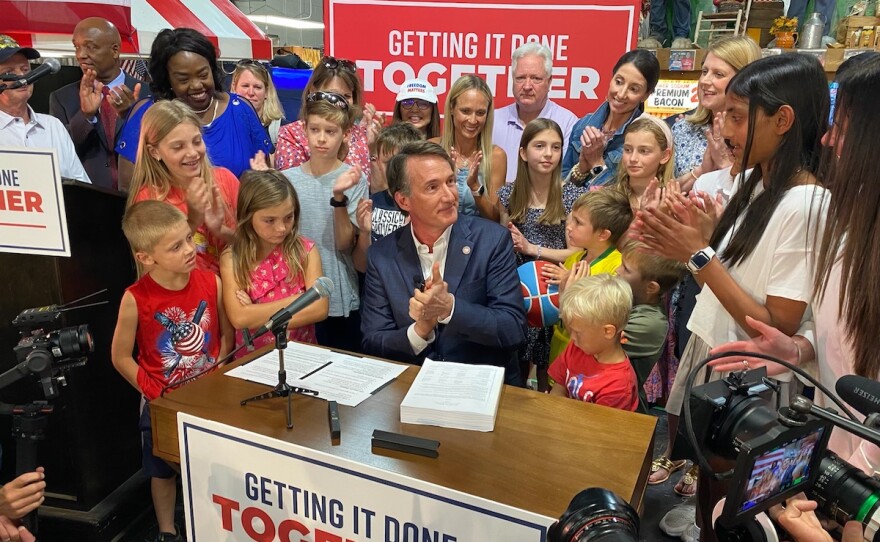Gov. Glenn Youngkin’s push to create new college-affiliated K-12 laboratory schools got a boost after he signed a budget on Tuesday that sets aside $100 million for the effort. While the money fell short of the $150 million he initially sought from the legislature, Youngkin called the money “start-up capital to allow us to get moving.”
Addressing a crowd of around two hundred supporters, lawmakers and press at a grocery store in Short Pump, Youngkin said the budget doesn’t include everything he wanted.
“We’re going to go back in January and get the rest,” he said.
It remains to be seen how many institutions will take advantage of the funding for the schools, which Youngkin has pitched as a way to introduce more innovation into K-12 education. According to records requests made by VPM News to all public Virginia colleges and universities in May, 10 of the 15 four-year institutions said they had no records of any plans for lab schools. Two did not respond.
George Mason University turned over records indicating that it’s in discussions with Fairfax County Public Schools and Northern Virginia Community College to potentially create a lab school. James Madison University cited a bill of $1,891.80 to turn over responsive records and Virginia State University withheld two records, citing an exemption designed to shield the governor’s working papers from public review.
Speaking to reporters after the Tuesday bill signing, Youngkin asserted there was broad interest in creating lab schools.
“We’ve already had universities and school boards come to me and say, ‘We're ready to go, just tell us when,’” Youngkin said.
Lt. Gov. Winsome Earle-Sears broke a tie vote in the Senate on Friday to extend lab-school eligibility beyond four-year public institutions to include community colleges and select nonprofit private universities in Virginia.
The budget language sets aside $5 million of the lab-schools funding to be used to award planning grants for entities “pursuing the creation of new college partnership laboratory schools.” Up to $20 million can be used to help pay for initial start-up costs. The Virginia Board of Education is authorized to distribute the remaining funds to support per-pupil costs for approved college partnership laboratory schools.
The budget signing would speed up the process, Younkin said: “I expect this next bit over the summer and as we head into the school year to be very, very busy.”
Youngkin also attempted — and failed — to change the way money flowed to the new lab schools. His proposal attempted to send per-pupil state dollars from public school boards to universities operating lab schools, but Senate Democrats rejected that budget amendment.
It’s unclear when funding for lab schools will be doled out; universities have to complete a detailed application for any lab school proposal and submit it to the state board of education. According to a spokesperson for the Virginia Department of Education, staff are working to update the application for distribution of lab-school funds and said the department hasn’t received any formal applications from colleges or universities yet.
A special state board of education committee— which has been dormant since 2013 and previously included Lt. Gov. Winsome Earle-Sears — reviews and vets lab school applications before making recommendations to the full board.
The DOE website lists Stephen Smith, director of the Central Virginia Governor’s School, as one of the education community members on the lab schools committee. Smith wrote to VPM News via email that “I truly can't recall how many years it has been since I attended a meeting of that committee.”
Dan Gecker, president of the state board of education, will be responsible for naming new members to this committee, per the board’s bylaws. Gecker was not immediately available for comment Tuesday. At the end of this month, there will be five vacant seats on the state board of education — seats Youngkin will get to replace.
The governor’s spokesperson, Macaulay Porter, said the board will review the lab school application process and timeline during its meetings on July 20 and 21, and also will discuss appointments to the Lab School Board Committee. Language in the state budget requires the board to present proposed guidelines to lawmakers by Dec. 1.
Youngkin’s campaign platform included bringing more choice to public education. He first announced his push for lab schools at an event in January, shortly after his inauguration. “I don't care whether you call them charter schools or lab schools, it's time for us to innovate in K-12 education,” Youngkin said at the event.
Youngkin asked higher education representatives who attended the event to sign an agreement to work to bring “design concepts to present to the people of Virginia by May 2022” with the goal of creating 20 new lab schools. While that timeline might have changed, the administration has continued to hold meetings on the plans. In early March, Secretary of Education Amy Guidera sent an email asking schools to submit “a short description of any potential lab school designs” by March 7, according to public records obtained by VPM News.
VPM News requested responses to that Google Form application from VDOE. A FOIA officer initially offered to send the responses in a spreadsheet, which she said contained 10-15 responses, but the department later withheld the file, citing the governor’s working paper exemption.
VDOE’s past use of the exemption sparked a lawsuit from the Reporters Committee for Freedom of the Press on behalf of a VPM News reporter. The department ultimately agreed to voluntarily hand over the file in question and pay $5,000 in attorneys fees without admitting any wrongdoing.




